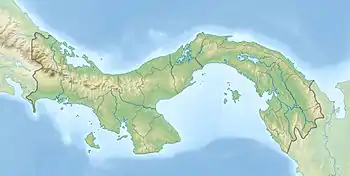| Cucaracha Formation | |
|---|---|
| Stratigraphic range: Early Burdigalian-Mid Langhian (Hemingfordian-Barstovian) | |
| Type | Formation |
| Underlies | Pedro Miguel & La Boca Formations |
| Overlies | Culebra Formation |
| Thickness | ~125 m (410 ft) |
| Lithology | |
| Primary | Sandstone, conglomerate |
| Other | Claystone |
| Location | |
| Coordinates | 9°00′N 79°36′W / 9.0°N 79.6°W |
| Approximate paleocoordinates | 8°24′N 77°30′W / 8.4°N 77.5°W |
| Region | Panamá Province |
| Country | |
| Extent | Panama Basin |
 Cucaracha Formation (Panama) | |
The Cucaracha Formation (Tca)[1] is a geologic formation in Panama. It preserves vertebrate and plant fossils dating back to the Neogene period; Early to Middle Miocene epochs (Hemingfordian).[2] Fossils of the crocodylian Centenariosuchus, the turtle Rhinoclemmys panamaensis and the artiodactyl Paratoceras have been found in the formation.[3]
The Cucaracha Formation is approximately 125 metres (410 ft) thick,[4] and dated to 19 to 14 Ma.[5]
Fossil content
- Centenariosuchus[6]
- Panascleroticoxylon[7]
- Paratoceras coatesi[8]
- Prioria canalensis, P. hodgesii[9]
- Rhinoclemmys panamaensis[10]
- Rourea blatta[11]
- Staurotypus moschus[10]
- Podocnemididae indet.[12]
See also
References
- ↑ Geologic Map, 1980
- ↑ Cucaracha Formation at Fossilworks.org
- ↑ Centenariosuchus at Fossilworks.org
- ↑ Kirby et al., 2008, p.9
- ↑ Kirby et al., 2008, p.11
- ↑ Hastings et al., 2013
- ↑ Rodríguez Reyes et al., 2017a
- ↑ Rincón et al., 2015
- ↑ Rodríguez Reyes et al., 2017b
- 1 2 Cadena et al., 2012
- ↑ Jud & Nelson, 2017
- ↑ Cadena et al., 2012, p.549
Bibliography
- Cadena, E.; J.R. Bourque; A.F. Rincón; J.I. Bloch; C.A. Jaramillo, and B.J. MacFadden. 2012. New turtles (Chelonia) from the late Eocene through Late Miocene of the Panama Canal Basin. Journal of Paleontology 86. 539–557. Accessed 2019-02-09.
- Hastings, Alexander K.; Jonathan I. Bloch; Carlos A. Jaramillo; Aldo F. Rincón, and Bruce J. Macfadden. 2013. Systematics and biogeography of crocodylians from the Miocene of Panama. Journal of Vertebrate Paleontology 33(2). 239–263. Accessed 2019-02-09.
- Jud, Nathan A., and Chris W. Nelson. 2017. A liana from the lower Miocene of Panama and the fossil record of Connaraceae. American Journal of Botany 104(5). 685–693. Accessed 2019-02-09.
- Kirby, Michael Xavier; Douglas S. Jones, and Bruce J. MacFadden. 2008. Lower Miocene Stratigraphy along the Panama Canal and Its Bearing on the Central American Peninsula. PLoS ONE 3. 1–14. Accessed 2019-02-09.
- Rincon, Aldo F.; Jonathan I. Bloch; Bruce J. Macfadden, and Carlos A. Jaramillo. 2015. New early Miocene protoceratids (Mammalia, Artiodactyla) from Panama. Journal of Vertebrate Paleontology 35(5). e970688. Accessed 2019-02-09.
- Rodríguez Reyes, Oris; Peter Gasson; Carolyn Thornton; Howard J. Falcon Lang, and Nathan A. Jud. 2017. Panascleroticoxylon crystallosa gen. et sp. nov.: a new Miocene malpighialean tree from Panama. IAWA Journal 38(4). 437–455. Accessed 2019-02-09.
- Rodríguez Reyes, Oris; Peter Gasson; Howard J. Falcon-Lang, and Margaret Collinson. 2017. Fossil legume woods of the Prioria-clade (subfamily Detarioideae) from the lower Miocene (early to mid-Burdigalian) part of the Cucaracha Formation of Panama (Central America) and their systematic and palaeoecological implications. Review of Palaeobotany and Palynology 246. 44–61. Accessed 2019-02-09.
- Stewart, R.H.; J.L. Stewart, and W.P. Woodring. 1980. Geologic Map of the Panama Canal and Vicinity, 1. USGS. Accessed 2019-02-09.
- Woodring, W.P. 1957. Geology and Paleontology of Canal Zone and Adjoining Parts of Panama - 306A Geology and description of Tertiary mollusks (Gastropods: Trochidae to Turritellidae), 1–186. USGS. Accessed 2019-02-09.
This article is issued from Wikipedia. The text is licensed under Creative Commons - Attribution - Sharealike. Additional terms may apply for the media files.